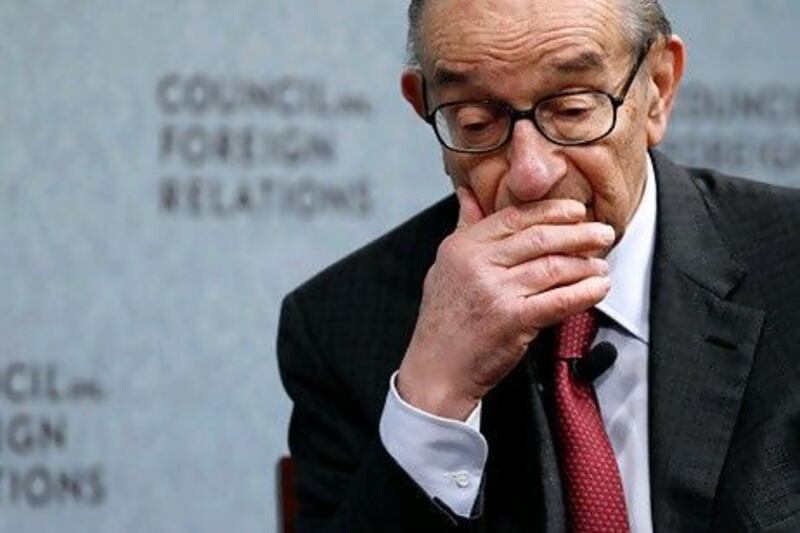Opec's 12 members earned about US$1 trillion (Dh3.67tn) last year. They are set to earn much more this year.
As we sit on the dawn of what looks like a global economic recovery spring dance after averting the winter Armageddon of a euro collapse, the simultaneous 25 per cent leap in West Texas Intermediate crude oil and US stocks remind me of the famous "irrational exuberance" warning from Alan Greenspan when he was Fed chairman.
"Clearly, sustained low inflation implies less uncertainty about the future, and lower risk premiums imply higher prices of stocks and other earning assets. We can see that in the inverse relationship exhibited by price/earnings ratios and the rate of inflation in the past. But how do we know when irrational exuberance has unduly escalated asset values, which then become subject to unexpected and prolonged contractions?"
Mr Greenspan made these comments in a speech to the American Enterprise Institutein 1996, when he still wore the halo of financial wizard, and yet he did nothing to heed his own warning, which ended with the 1997 collapse of Asian economies, the first internet bubble burst and landed us with an oil price of under $10 a barrel. His successor, Ben Bernanke, has done his own exuberant two-step of printing cash like confetti with a guarantee to keep money free until 2014 - you could put the same comment by Mr Greenspan on the front page of the Financial Times today and it would be as relevant and timely.
The fourth quarter of last year and the first quarter of this year are separated by a Grand Canyon of logic with wallops of comfort food served up by another central banker, Mario Draghi, with the European Central Bank printing of €1trillion.
The reality is that we appear deluded by the same mirage that sent us off a cliff in 2008, meaning that credit, pretend-printed cash and unearned wealth are real. The illusion triggered by a 25 per cent jump in asset values is meaningless when in the background an inflation tsunami is destroying the value of money … how else do you pay off $15tn of US national debt?
Cash isn't worth the paper it's printed on, at least that's what the Swedes believe, as they move to ban it in most public places, a bit like cigarettes - a nasty little habit.
Yet the world appears to be in a deer-in-the-headlights moment, with the view that if a tree falls in the forest and there's no one there to hear it, it doesn't make a noise.
It strikes me that Mohammed El Arian, the Egyptian-American chief executive of Pacific Investment Management Company, has coined a somewhat appropriate phrase for this counter-intuitive period in which we live. It is the era of - "the new normal", where former contradictory forces can co-exist: record corporate profits and soaring stocks with record unemployment, and $100-plus oil, and frenzied capitalist economics with communist governance managing a slowdown.
So with that logic, is it safe to go back into the new-normal water, safe to open the metaphoric economic investment belt by just a hole or two? For all of us in the Gulf neighbourhood, most things depend on whether we buy into the view that we've moved into a new epoch of triple-digit crude oil prices, allowing countries and companies to plan with some certainty; most Gulf states are inching their annual budgets closer to $100 oil.
There are certainly strong narratives to support both paths up and down the mountain - demand erosion with recession in the European Union and slowdown in China versus more US jobs, limited increase in global oil production capacity and security of supply with drumbeats of unrest across the Middle East. As Nassim Taleb,a Lebanese-American economic philosopher, might say, we have certainly had our fair share of black swans - random unpredictable events that can have a huge impact on our lives. Last yearwe saw the Japanese earthquake and the rolling Arab Spring helping to keep Brent crude propped above $100.
It is a brave man who bets against Newton's what-goes-up-must-come-down thesis, as we saw the last time stock markets and oil prices were at these levels, about this time of year in 2008.
*Sean Evers is the managing partner of TheGulfIntelligence.com
twitter: Follow and share our breaking business news. Follow us





